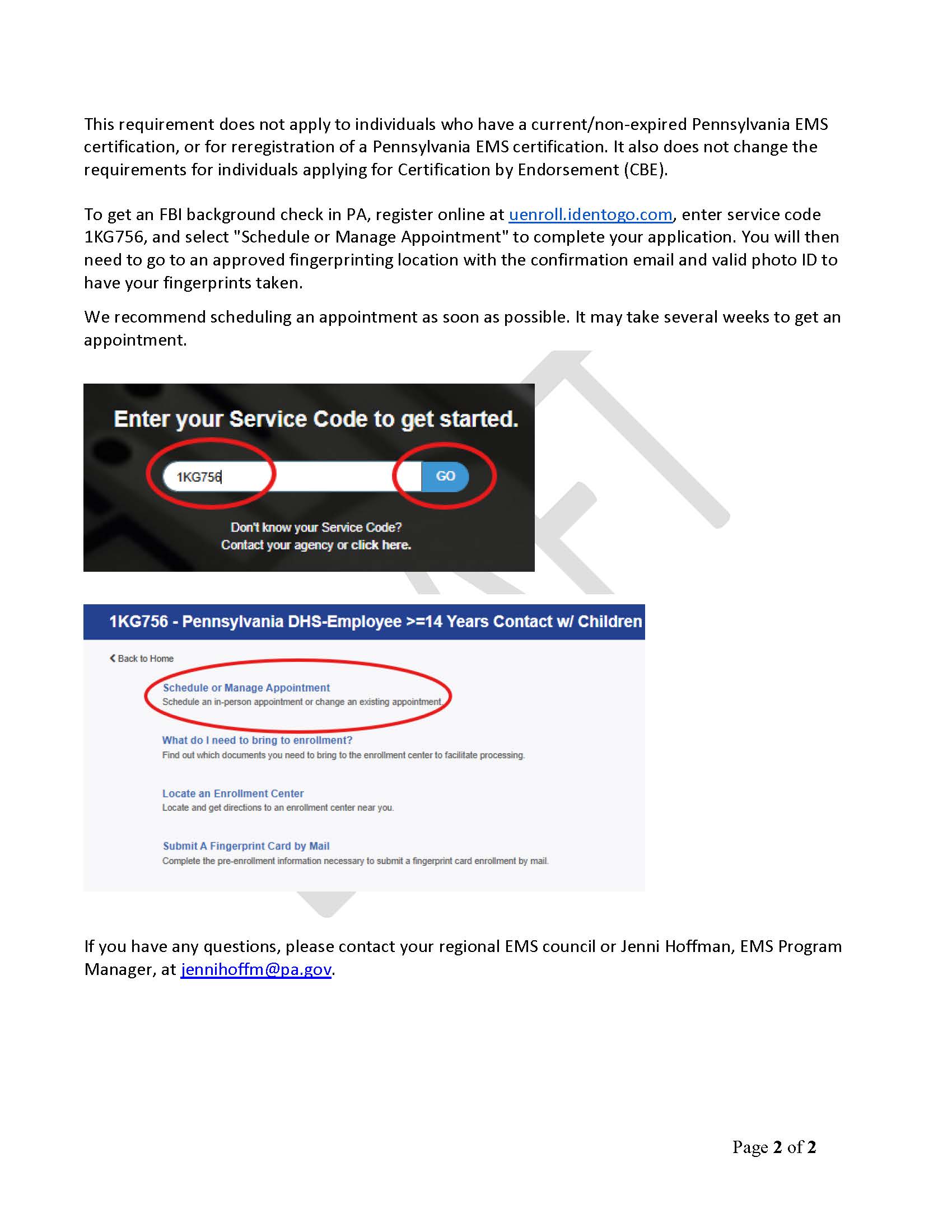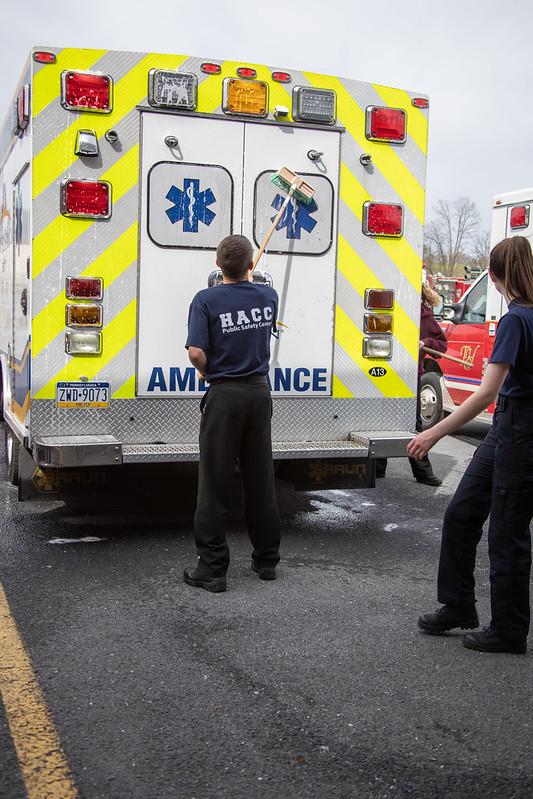Emergency Medical Technician
The Senator John J. Shumaker Public Safety Center is a Pennsylvania Department of Health Accredited Certification Training Institute. This entry-level training course is for first responders at the scene of a trauma or medical emergency. Upon successful completion of the EMT Program, students are eligible for their EMT certification exams.
The program is offered in both an in-person and an online/blended format. We encourage you to complete the Self-Assessment for Online Learning to determine your potential aptitude for online learning. Students enrolling in the blended program are expected to have a basic understanding of Internet navigation methods that include browser navigation, utilizing bookmarks, search terms, navigating to web addresses and utilizing hyperlinks.
Please note:
- Students must be 16 years old or older before the first day of class.
- We will not accept registrations less than 14 days before the program start date.
- Payment is due at the time of registration.
- Organizations that are paying on behalf of a Student, Please register using this form: Permission to Bill
- Tuition for the EMT program is $925.
- The textbook is not included. It is the responsibility of the EMT student to obtain the required textbook for the EMT Program. Students MUST have a textbook by the first class. The required textbook is: Emergency Care and Transportation of the Sick and Injured Essentials, 12th ed.
- The textbook may be obtained directly from the publisher or other retailers such as Amazon.
- Students are required to wear a uniform to every class session. HACC provides uniform shirts. Students are responsible for navy blue work pants, black work boots, and a black belt.
- These exams are administered by the Pennsylvania Department of Health–Bureau of EMS/National Registry of EMTs (psychomotor) and the National Registry of EMTs/Pearson-Vue test centers (cognitive).
- There is a separate fee associated with the Cognitive exam ($98/attempt) that is paid to the National Registry of EMTs.
- As of January 1, 2026, all students must have a completed FBI criminal background check in order to create an application for the Department of Health. Applications submitted without an FBI background check will not be accepted and returned to the student. Failure to have a completed application will prohibit the student from taking the required NREMT exams and therefore prohibit the student from certification. The background check cannot be more than 90 days old at the time of submission of the application. You can obtain your background check by clicking HERE or visiting https://www.pa.gov/services/dhs/apply-for-an-fbi-criminal-history-background-check and clicking on “Make an appointment to start your application.”

What can I do as an emergency medical technician (EMT) in the workforce?
$9-$15/hour
Average Pay
(Source: salary.com)
What are HACC’s classes like?
Our online/blended EMT Program is a combination of self-paced, online modules with interactive assignments and discussions. Students are required to attend in-person lab sessions throughout the program to demonstrate their competency in numerous psychomotor skills, complete testing requirements and prepare for the National Registry of Emergency Medical Technicians (NREMT) examinations.
The EMT course is 220 hours of instruction that covers the following in accordance with the National EMS Education Standards:
- Anatomy and physiology
- Assessment of injuries and illnesses (medical and Trauma)
- Assisting patients with their own prescribed medications
- Cardiopulmonary resuscitation (CPR) and automated external defibrillation (AED)
- Environmental emergencies
- Lifting, moving and transportation of patients
- Pediatric and geriatric emergencies
- The overall roles and responsibilities of the EMT
Both the in-classroom and blended EMT Programs require mandatory corequisite courses listed below. The due dates for these courses are determined by your specific course syllabus and are to be completed in order to be eligible for your NREMT certification exam. More information will be provided at the first class.
- Hazardous Materials Response - Awareness
- NIMS IS-100: Introduction to Incident Command System (ICS)
- NIMS IS-200: ICS for Single Resources and Initial Action Incidents (Prerequisites: NIMS 100 and 700)
- NIMS IS-700: National Incident Management System (NIMS), An Introduction
- NIMS IS-800: National Response Framework, An Introduction
Refund Policy
If HACC cancels a course, training, seminar, conference or trip/tour, all paid participants will receive a 100% refund of all tuition and fees. Any student who wishes to drop a course may do so by visiting or calling any of the campus Welcome Centers. These requests must be made no less than one (1) calendar day prior to the first class meeting date to be eligible for a full refund of tuition and fees, except for any tuition or fees noted as nonrefundable. Unless otherwise specifically stated or approved, no refund will be issued after a class start date. We do not issue partial refunds in the event a student starts a class late or does not complete the class. Students receiving Title IV Financial Aid will be subject to the federal regulations regarding withdrawal of classes. Financial Aid eligibility will be recalculated based on dates of participation in financial aid eligible programs.
Day Key: U=Sunday, M=Monday, T=Tuesday, W=Wednesday, H=Thursday, F=Friday, and S=Saturday
HACC reserves the right to charge, increase or change a fee. We will cancel the class if it does not meet the minimum enrollment by 15 calendar days before the start date.
Effective October 27, a service fee now applies to all HACC purchases made with a credit or debit card. Please note:
• All HACC purchases made with a credit card are subject to a service fee.
• The service fee is 2.95% for domestic credit cards and 4.25% for international credit cards.
• For additional details, refer to the Frequently Asked Questions page.
• Once accepted, the service fee is non-refundable, including when a course is dropped or canceled.
Students enrolling through Course Merchant can now pay by card or eCheck.

